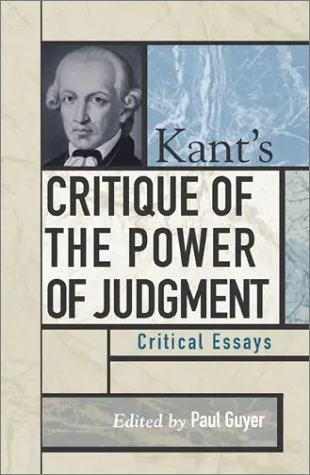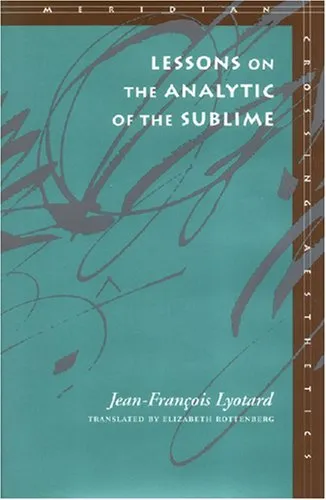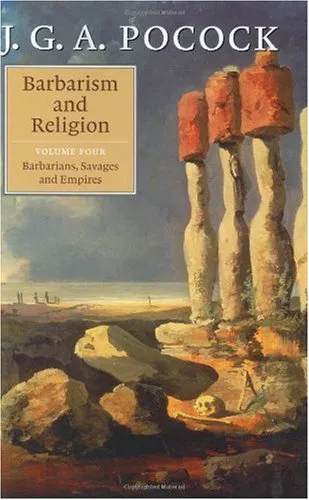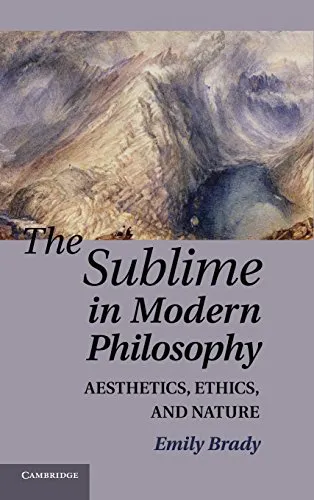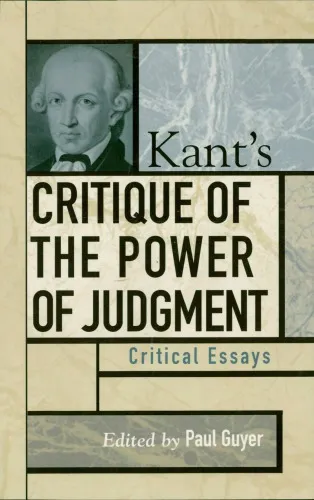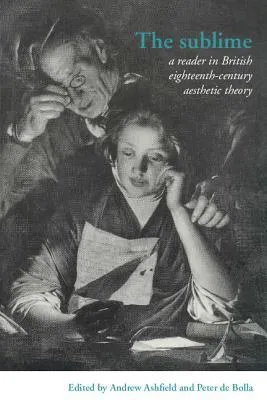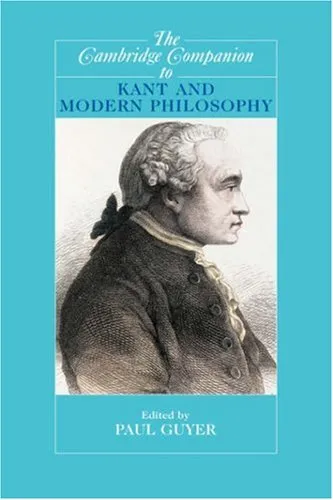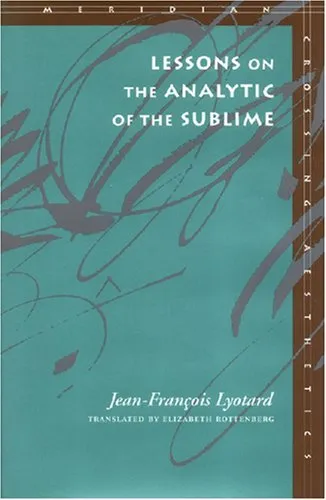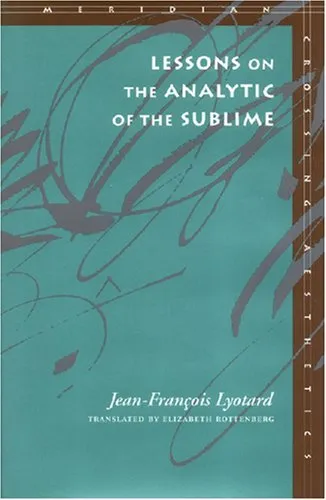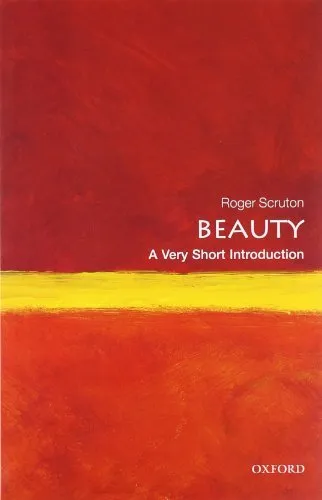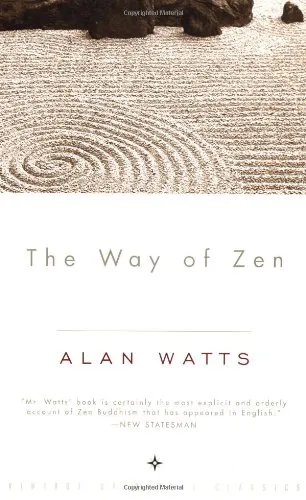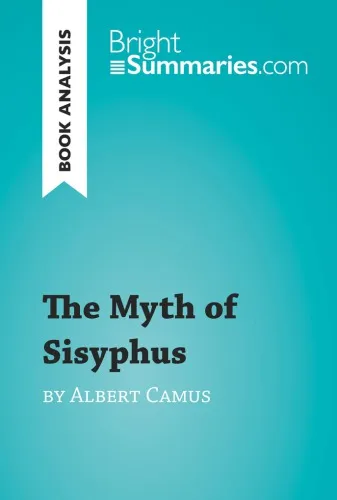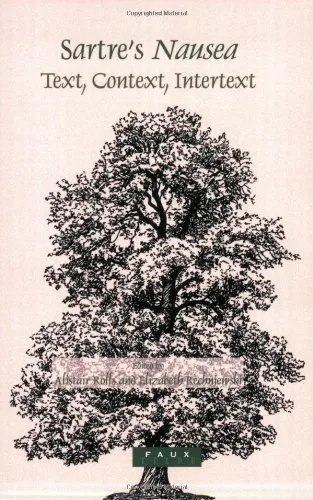Kant's Critique of the Power of Judgment: Critical Essays (Critical Essays on the Classics Series)
4.0
بر اساس نظر کاربران

شما میتونید سوالاتتون در باره کتاب رو از هوش مصنوعیش بعد از ورود بپرسید
هر دانلود یا پرسش از هوش مصنوعی 2 امتیاز لازم دارد، برای بدست آوردن امتیاز رایگان، به صفحه ی راهنمای امتیازات سر بزنید و یک سری کار ارزشمند انجام بدینکتاب های مرتبط:
معرفی کتاب
کتاب «Kant's Critique of the Power of Judgment: Critical Essays» مجموعهای از مقالههای انتقادی است که به تحلیل و نقد نظریات امانوئل کانت در زمینه قوه حکم میپردازد. این اثر با وجود گذشت دههها از زمان انتشار آثار کانت، همچنان از اهمیت ویژهای برخوردار است و در مباحث فلسفی و زیباییشناسی جایگاه خاصی دارد.
خلاصهای جامع از کتاب
کانت در سومین نقد خود، یعنی «نقد قوه حکم»، تلاش میکند تا پل ارتباطی میان تجربههای حسی و فهم عقلانی برقرار کند. او به بررسی مفهوم زیبایی و هنر و همچنین انگیزههای طبیعی میپردازد. در این مجموعه مقالات، نویسندگان به تجزیه و تحلیل دقیق این آثار پرداختهاند و جنبههای مختلف آثار کانت را بررسی نمودهاند. این کتاب بهمنظور کمک به خوانندگان برای درک بهتر اندیشههای کانت نوشته شده است و شامل مقالههایی از نویسندگانی چون پل گاویر، نیک زانگوییل و دیگران میباشد.
نکات کلیدی
- بررسی عمیق مفهوم Judgment از دیدگاه کانت و تاثیر آن بر فلسفه مدرن.
- تحلیل نقش زیباییشناسی در قوه حکم و چگونگی ارتباط آن با مفاهیم اخلاقی و علمی.
- تبیین تفاوتها و شباهتها بین تفاهم نقد قوه حکم با سایر نقدهای کانت.
نقلقولهای معروف از کتاب
«کانت بر این باور است که داوری زیبایی نه از طریق حس و نه از طریق مفاهیم عقلانی، بلکه از طریق احساساتی که در ما برانگیخته میشوند، تحقق مییابد.»
«زیبایی نمایانگر یگانگی است که تنها در هماهنگی میان قوانین طبیعت و آزادی پیدا میشود.»
چرا این کتاب مهم است؟
این کتاب اهمیت ویژهای در بررسی جامع و دقیق از کار کانت دارد. کانت با این نقد، تلاش کرد تا پیوندی میان حواس و عقل برقرار کند و به فهم عمیقتری از فلسفه و زیباییشناسی دست یابد. مقالات موجود در این کتاب نقش بسزایی در تحلیل و تفصیل مفاهیم پایه فلسفی او دارند و برای پژوهشگران و علاقهمندان به فلسفه غرب، به ویژه فلسفه آلمانی، بسیار مفید است. همچنین، این اثر به عنوان منبعی مهم برای مطالعه کارهای کانت به شمار میآید و به درک بنیادینتر از اندیشههای فلسفی و زیباییشناسی کمک میکند.
Introduction to "Kant's Critique of the Power of Judgment: Critical Essays"
Edited by Paul Guyer and featuring contributions from esteemed scholars such as Nick Zangwill, Christopher Janaway, and Eva Schaper, "Kant's Critique of the Power of Judgment: Critical Essays" offers a comprehensive exploration into Immanuel Kant's profound work on aesthetics and teleology. This collection is an essential resource for anyone seeking a deep understanding of Kant’s third Critique and its enduring impact on philosophical thought.
Summary of the Book
"Kant's Critique of the Power of Judgment: Critical Essays" delves into the complexities of Kant’s theories on judgment, beauty, and the sublime. The book is structured to facilitate a rich analysis of the two main parts of Kant's Critique: the 'Critique of Aesthetic Judgment' and the 'Critique of Teleological Judgment'. Each essay examines the nuances of Kant's arguments, providing insights into his philosophy, especially concerning the unity of human experience and the interrelation of our cognitive faculties.
The first set of essays focuses on aesthetic judgment, discussing Kant's idea that aesthetic experience is a unique form of awareness, distinct from both cognitive and moral spheres. This section includes a critical evaluation of Kant's famous concepts like disinterestedness in aesthetics and the universality of aesthetic judgments. The subsequent essays explore teleological judgment, providing in-depth discussions on Kant's argument that nature itself is purposive, which is crucial for understanding the systematic unity of all our cognitive capacities.
Each contributor brings a unique perspective, ensuring that the book covers a diverse range of interpretations and critiques of Kant's seminal work. The essays collectively argue for the continued relevance of Kant's ideas not only in philosophy but also in fields like art theory, biology, and environmental ethics.
Key Takeaways
- Kant’s establishment of a new approach to aesthetic experience that prioritizes subjectivity yet aspires to universal validity.
- The integration of beauty and purposiveness within nature, crucial to his vision of the harmony between human and natural worlds.
- Insight into how teleological judgment supports Kant's broader philosophical projects, including his moral theory.
Famous Quotes from the Book
Although this collection does not directly attribute new quotes, it meticulously analyzes significant passages from Kant’s own work in the Critique of the Power of Judgment. Here are a few excerpts that the book might tackle:
"The beautiful is that which, apart from a concept, pleases universally." — Immanuel Kant, Critique of the Power of Judgment
"Judgments of taste are, accordingly, not determinable by means of proofs but may only be expected to receive confirmation through the agreement of others." — Immanuel Kant, Critique of the Power of Judgment
Why This Book Matters
Kant's "Critique of the Power of Judgment" is pivotal to understanding modern aesthetic theory and philosophy. This collection of essays is significant because it offers a diverse range of interpretations and critiques by leading Kant scholars, making complex ideas accessible while stimulating further scholarly discussion. By explicating Kant’s theories with clarity and depth, the book plays a crucial role in enriching the reader’s appreciation of the intersection between aesthetics and philosophy.
In addition to its philosophical significance, "Kant's Critique of the Power of Judgment: Critical Essays" contributes to contemporary debates on how aesthetic experiences influence ethical and environmental considerations. By engaging with this book, readers gain a deeper grasp of how Kant’s ideas can be applied to current issues, demonstrating the timeless nature of his thought.
دانلود رایگان مستقیم
شما میتونید سوالاتتون در باره کتاب رو از هوش مصنوعیش بعد از ورود بپرسید
دسترسی به کتابها از طریق پلتفرمهای قانونی و کتابخانههای عمومی نه تنها از حقوق نویسندگان و ناشران حمایت میکند، بلکه به پایداری فرهنگ کتابخوانی نیز کمک میرساند. پیش از دانلود، لحظهای به بررسی این گزینهها فکر کنید.
این کتاب رو در پلتفرم های دیگه ببینید
WorldCat به شما کمک میکنه تا کتاب ها رو در کتابخانه های سراسر دنیا پیدا کنید
امتیازها، نظرات تخصصی و صحبت ها درباره کتاب را در Goodreads ببینید
کتابهای کمیاب یا دست دوم را در AbeBooks پیدا کنید و بخرید
1451
بازدید4.0
امتیاز0
نظر98%
رضایتنظرات:
4.0
بر اساس 0 نظر کاربران
Questions & Answers
Ask questions about this book or help others by answering
No questions yet. Be the first to ask!
